
16 minute read
Vintage Countdown
Skilled foreign vintage workers ready and waiting
SOPHIE PREECE
EXPEDITING APPROVALS for international vintage workers stranded in New Zealand is the “highest and most urgent priority” of a labour think tank in Marlborough. Vintage 2021 will require a “small army” of New Zealanders, trained by seasoned cellar hands, says Brendon Burns, chair of the Marlborough Regional Skills Leadership Group (RSLG). “We have a big challenge in vintage 2021 and one of our key tasks is to try and secure those visa holders to get into wineries as soon as possible, and start training Kiwis.”
Two thirds of Marlborough’s 2020 vintage workforce was from overseas, according to a Wine Marlborough remuneration survey, with 490 on working holiday visas and 431 on Essential Skills - Approval in Principle (AIP). Another 20% of the cellar crew were permanent staff, while just 14% were New Zealand seasonal vintage workers.
Covid-19 paints a completely different picture for the looming vintage, with most of the foreign workforce locked out by closed borders. There are 210 experienced international vintage workers still in New Zealand from 2020’s harvest, and they’ll be a vital resource to train up workers for the remaining 800 positions, says Brendon. “Everyone who has worked vintage knows you are under enormous pressure and big days, and you don’t need someone who is not up to speed.”
While he is confident AIPs will be turned around in time for vintage, the system needs to be expedited to ensure they’re available far sooner, he says. The RLSG - which contains regional industry leaders, economic development agencies, iwi, union and Government representatives - has been communicating with stakeholders and Government to ensure the message is getting across, he says. “It doesn’t matter what the solution is as long as you get those people into the wineries now.”
Marlborough’s RLSG is one of 15 regional groups established to ensure regions have the future skills and workforce they need. Last month the Marlborough group released a Local Insights Report, looking at some of the challenges and opportunities facing the region, which was struggling with labour issues before Covid-19 pulled the rug out from under the feet of industries like wine.
The report notes that restrictions carried on the coattails of the pandemic could influence a “paradigm shift” in terms of how employers source their labour supply “and, in doing so, help resolve some of Marlborough’s longer-term labour market issues”. One of the opportunities promoted by the RLSG is in creating year-round employment, to “combat the reluctance” of locals to take up seasonal positions. It suggests a “labour hire company” approach could see people employed in vineyards for busy harvest or pruning periods, then utilised in other industries at other times of the year. “Further work is required from Government and wider industry to ensure sustainable employment is offered, along with the opportunity to upskill,” says the report.
They also raise the opportunities of adapting local training, with polytechnics bridging skills gaps and becoming more flexible in how they offer their courses and respond to industry needs. Nelson Marlborough Institute of Technology has already made moves in that direction, with more frequent student intakes, and a new 19-week cellar hand course.
Brendon says Covid-19 has revealed the vulnerability of being dependent on migrant labour – including the 3000 Recognised Seasonal Employer scheme workers who typically come from the Pacific Islands to work in Marlborough vineyards in the busy winter pruning and summer growing seasons. “Clearly there is going to be a major shift here - whether it’s permanent or just temporary is unclear,” he says. “But we’ve had a huge reliance - perhaps in hindsight an overreliance - on imported labour.”
Sales Strong
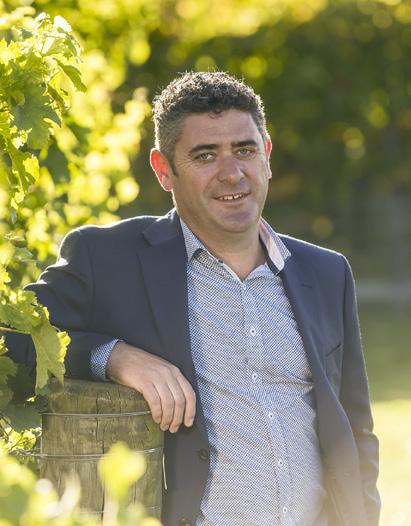
Vineyards still seen as solid investment
LOW INTEREST rates and returning Kiwis are driving a strong vineyard market, says Bayleys wine industry specialist Mike Poff.
“A combination of these factors has seen a very active market where all older listings have now been sold through and all current listings are selling quickly.” And the listings keep coming, as vendors recognise the “excellent sales climate”, he adds. “We are still seeing good amounts of stock coming to the market.”
As well as low interest rates and pandemic returnees, the market is being influenced by current investors choosing to trade up into a larger property or trade down into something smaller, he says. “Many local buyers are looking at expanding their land holdings to create better economies of scale within their existing business, or families working through succession and selling off larger assets to free up capital to then downsize or invest in the residential market, which also remains strong.”
There is also an increase in vineyard investment from people looking to diversify their portfolio from other sectors “to purchase assets that have solid returns and are in the primary sector”, Mike says. To attract their interest, vineyards have to be a solid long-term investment, he adds.
With continued strong demand for wine throughout the fast-moving consumer goods network, and a potentially lower crop in 2021 due to spring frosts, he expects to see demand and prices remain strong. “With the forecast for low interest rates over the next wee while, and a continual influx of expats and other Kiwis, we see great opportunities for both buyers and vendors going forward.”
PROTECT YOUR PRODUCT. PROTECT YOUR PROFIT.
Tried and tested in a 7.8 magnitude earthquake, ONGUARD is the first seismic system designed to protect liquid storage tanks from earthquake damage.
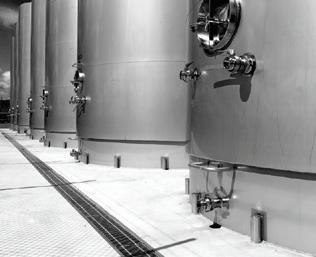
STOP YOUR LIQUID ASSETS FROM GOING DOWN THE DRAIN, CONTACT US TODAY.
0800 661 155
ONGUARDGROUP.COM
Plastic Fantastic
Transforming vineyard waste
SOPHIE PREECE
TURNING PLASTIC waste into vineyard posts is a “fantastic idea that makes a huge amount of sense”, says Marlborough grape grower Ben McLauchlan. “But we want to ground truth it and give people an opportunity to come and see.”
Ben recently hosted a Future Post open day on his Wratts Rd property, where several rows of sturdy plastic posts had been installed the day before, alongside trials of pine and steel posts on the block. He says the block allows growers and wine companies to explore solid alternatives to copper, chromium and arsenic (CCA) treated posts, which are known to leach heavy metals into the soil, including when stockpiled, and are difficult to dispose of when broken.
Future Post founder Jerome Wenzlick attended the open day and explains that each leachate-free and UVstable post is made from hundreds of used milk bottles and thousands of soft plastic bags. The product won the Fieldays Innovation Award last year and has enabled soft plastic collection to resume in several parts of the North Island, as the company welcomes increasing amounts of waste. Jerome says in the past six months, sales at Future Post have boomed, and so has the company’s ability to take waste, with 145 tonnes of plastic accepted each month, including 45 tonnes of soft plastics.
The business began two and a half years ago, after Jerome - a fencer by trade - struggled to ram posts into land once used as a rubbish dump. As posts broke in plasticcontaminated soil, he came up with a solution to both problems, then charged up his Kiwi ingenuity to establish a factory in an empty shed at Waiuku, with a New Zealanddesigned machine to create the posts. Soft and hard plastic waste is cut up into small chips of 10mm flakes and mixed in a “recipe” of ratios, before being extruded and forced into a mould, “so a post comes out the end”, he says.
As well as offering vineyards a better post option, Future Post can take plastic vine guards and broken irrigation pipes out of the waste stream, and repurpose them into posts, says Jerome, who is planning to open a factory in the South Island.
He says the posts, which have been trialled at a couple of other Marlborough vineyards in recent years, are as strong as their wooden counterparts, but with more flexibility, reducing the risk of breakage. If they do break, they can be sent back to the factory and be reused all over again, he adds.
New Zealand Winegrowers recently released new sustainability guidelines for the storage and disposal of CCA treated posts, with Marlborough home to more than 15 million of them. According to the guidelines, 2% to 5% of the posts are broken each harvest “depending on soil type, soil moisture content and the operation of the harvesters” resulting in 11 to 29 posts per hectare per year being stored or disposed of.
The guidelines emphasise that growers must never burn treated wood, which leaches toxic fumes into the environment. It gives guidelines for storage, including ways to prevent leaching by covering the piles if possible, and having them on an impervious surface at least 20 metres from a waterway.
Ben is on the cusp of a new vineyard development, and says information on the leaching of treated posts has him “thinking twice” about people handling them. Driving the Future Posts in the day before the open day, he was impressed with their strength and ease of use. “I can’t see why we wouldn’t go forward with them.”
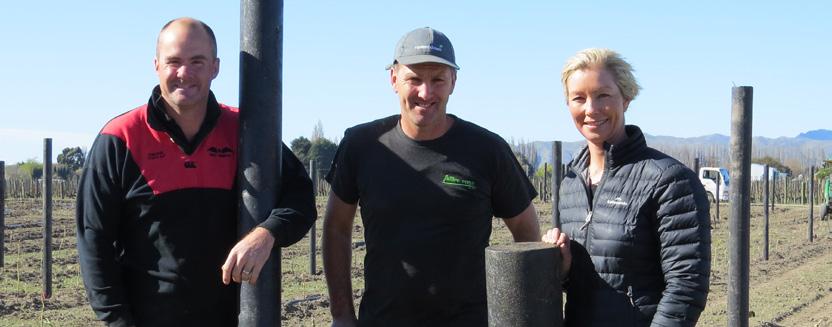
Ben McLauchlan, Jerome Wenzlick and Future Post representative Diana Jamieson
Young Vit 2020
Green light for Marlborough viticulturist
SOPHIE PREECE

NO TRAFFIC lights in the streets and no stop lights on vineyard expansion. That’s how Rhys Hall described Marlborough to his audience at the Corteva New Zealand Young Viticulturist Competition last month, before taking the national title.
“We like to think of ourselves as the big industry in a small, close-knit community where you can work hard and play hard,” said Indevin’s Bankhouse assistant manager, happily praising the region. “Let’s talk about the weather,” he continued, sharing insights into frosts and sleepless nights, followed by sunshine and t-shirts, even during winter. “If Donald Trump lived here, he would not need fake tan.”
Rhys’s speech at the finals was an opportunity to wax lyrical about a region he loves, while flexing skills honed since his first “nerve-racking” speech at the 2019 regional competition, facing 120 industry members. “I had to improve on that. I joined Toastmasters and that was great for my public speaking confidence,” says Rhys. “I still don’t enjoy it a lot, but it’s definitely easier for me.” That’s just one of the ways the young viticulturist competition has helped him grow his talents, he says. “It’s good because you see your strengths and what you can improve on.”
Rhys grew up in a rural corner of England and says summers with his grandparents in Spain, visiting bodegas and tasting wines, gave him an interest in seeing how they grew. He moved to Auckland when he was 11 and knew from an early age that he wanted to do something in production. By the time he left school, viticulture appealed, but he wanted to keep his options open, so studied horticulture at Massey University. Summer internships in vineyards helped firm his resolve, because “something fascinated me about the production system”, he says. So when he was offered a job by Farmlands, with kiwifruit in Tauranga or grapes in Marlborough, he immediately opted for the vines, working as a “viticulture champion” at the Farmlands store.
After 18 months he was ready to get experience in the rows, so applied for a casual job driving tractors for Indevin. He hasn’t looked back, seeing Bankhouse as an amazing opportunity to work on a “massive site” with major expansion plans. The Waihopai vineyard already has 600
planted hectares, with another 900ha to be planted over the next five years. “That will be an exciting expansion,” says Rhys, who relishes the challenges and opportunities inherent in operating at such a large scale.
Frosts can impact one portion of the vineyard completely differently to another, with potential for “massive temperature difference”, he says. And when it comes to logistics and planning at that scale, “you have to think a bit differently and do things differently”. His Bankhouse role has him managing large teams of people, which has been another huge growth area. “I try to keep it simple. Everybody is different and you have to understand them as a person - understand their goals and what they want out of their job.” Rhys has learned that communicating clearly with people “solves 90% of the problems”.
If Bankhouse has taught him a lot, the young viticulturist competition has been the icing on the cake. “I feel I have a lot more confidence in who I am and what kind of viticulturist I am.”
Go Early and Go Hard against Powdery Mildew!
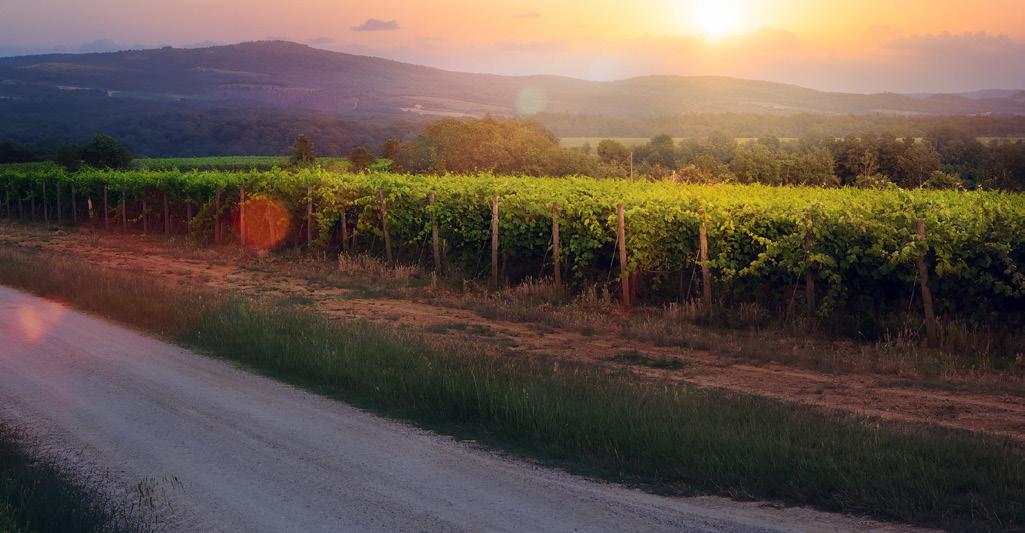
Start early and go hard for better disease control
For robust Powdery Mildew control apply HML32 and additives in the run up to flowering and again at first flower opening / 5% flowering (10 days apart). HML32 with the addition of sulphur and copper deals a blow to microscopic Powdery Mildew - both preventatively and eradicatively. Powdery mildew is a major pre-cursor disease to the onset of botrytis; HML32 - if applied correctly - deals with both.
Follow up after flowering with alternating HML32 and Protectorhml combinations at 7-10 day intervals. Recover after major weather events.
PRE FLOWERING
PRE FLOWERING
EL16-17
12 leaf, well-developed inflorescences HML32 + sulphur + copper HML Silco (optional)
EL18-19
First flower to 5% flowering HML32 + sulphur + copper HML Silco (optional)
FLOWERING
EL23
50% capfall Protector + sulphur
END OF FLOWERING
EL25-26
80-100% capfall HML32 + sulphur + copper HML Silco (optional)
Henry Manufacturing Ltd For more information about the recommended spray programme from flowering to veraison, visit www.henrymanufacturing.co.nz Call Chris Henry on 027 294 1490 email chris@henrymanufacturing.co.nz or contact your local technical advisor.
Generation Y-ine
Callum Haynes on the culture, challenge and celebration of wine

SOPHIE PREECE
CALLUM HAYNES loves making wine, but he’s even more interested in crafting a welcoming winemaking culture. “I want people to come into work and love what they do.”
The Matua vintage winemaker, who was placed second in the recent Tonnellerie de Mercurey Marlborough Young Winemaker competition, is also focussed on a “more sustainable agenda”, reducing waste in wine. “As great as it is to make funky wines, I would rather make a difference,” he says. “Looking after the planet for future generations, so everyone can keep enjoying wine. And that people are happy in the workplace and love what they do.”
That kind of change-agenda is reflected in the younger generation coming up through the wine industry, he says. “I like to think there are going to be some big changes in the wine industry and it is going to come from this younger generation.” Those change-makers were well represented at the young winemaker competition, where contestants blended and marketed wines, did a cellar challenge and lab test, and gave a speech via Zoom, due to Covid-19 restrictions. “I think there’s passion in our industry,” says Callum. “You know when people’s eyes light up and you see the spark - that’s what I love.”
When he left high school, the Cantabrian wanted to be a brewer, planning to combine his love of chemistry with his love of beer. Unsure how to go about that career, he went to Lincoln University to study winemaking and viticulture instead, and dreams of brewing were soon overwhelmed. “It very quickly became clear that I prefer the challenge of wine, because it’s not reproducible,” he says, delighted by the variability of wine, dependent on vintage and winemaker decisions. “Every challenge is different. It’s a new thing to work with. I like the uniqueness of the wine industry.”
When he finished university, Callum set his sights on adventure, because “my belief is that anyone who is good in their role has experienced an array of things”, he says. “I would much rather be experience rich than cash rich.”
Three years working at Delegat in Marlborough – the first during his studies and the final two on the graduate winemaker programme – bolstered his adventure bank account and he set off to work a vintage in Australia, finding some “amazing people” at a winery in Langhorne Creek, on South Australia’s Fleurieu Peninsula.
From there he went to Germany for six months, putting four years of high school German to good use on a site where no one spoke English. “It was a very strong dialect – I spent a week or two being lost, but then you embrace it and deal with what you have got.” After three months of vintaging and three months of exploring, he went to
Western Australia for his first experience of a small winery, which sourced fruit from across the country. That artisanal focus, and valuable mentorship, changed his perspective, “and now that I am back in big wineries, that’s something I never want to lose”, he says.
Six months of wine work earned him six months of backpacking and hitchhiking in eastern Europe, before returning to the same small winery to earn money for another six months of travel, exploring South America. The eventual call of home meant he was back in New Zealand last summer, and by harvest he was in the role of vintage winemaker at Matua. “I had some hesitation about coming into a big corporation after working in a small place,” he admits. “But I love it here. There is an amazing culture at Matua.”
Just as mentors changed his journey when in Western Australia, Matua’s team have been influential in helping Callum develop. “I spend a lot of time soaking up knowledge from Peter Russell, the winner of this year’s (young winemaker) competition,” he says. “Learning is so much easier when it’s taught by the passionate and driven - all I need to do is have willing and listening ears.”
National final for Marlborough’s top young winemaker As this magazine went to print, Matua’s production winemaker Peter Russell was busy preparing for the national final of the 2020 Tonnellerie de Mercurey New Zealand Young Winemaker of the Year. The national final is to be held at Eastern Institute of Technology in Hawke’s Bay on November 6, with Peter going up against Ben McNab, assistant Winemaker at Matahiwi Estate in Hawke’s Bay, and Ben Tombs, assistant winemaker at Peregrine Wines, Central Otago. Apart from being crowned the, the national winner will take home a prize package that includes a travel grant to visit the cooperage (Tonnellerie) in Burgundy, be an associate judge in the New World Wine Awards and review wines in DrinksBiz magazine.
Grow your career online
> Bachelor of Viticulture and Winemaking (Level 7) > New Zealand Certificate in
Horticulture Viticulture Fruit
Production (Level 4) > New Zealand Certificate in
Cellar Operations (Level 4) > New Zealand Certificate in
Cellar Operations (Level 3)
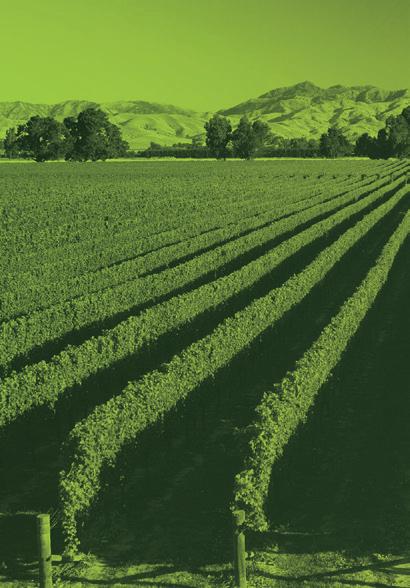
Tailored and online course options designed to meet industry needs now available. Located in the heart of New Zealand’s wine industry our campus offers world-class facilities, research vineyard and the opportunity to rub shoulders with scientists at the Bragato Research Institute.
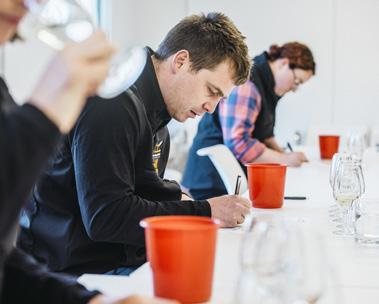
nmit.ac.nz/viticulture




